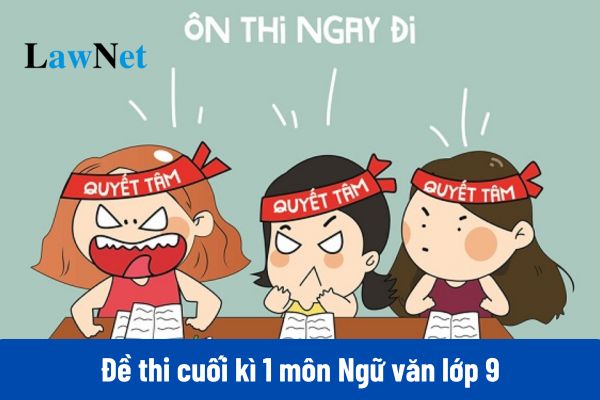Vietnam: What are the Top 03 sets of 1st end-of-semester question papers and answers for 9th-grade Literature? What is the eligibility for lower secondary graduation recognition for 9th-grade students?
What are the Top 03 sets of 1st end-of-semester question papers and answers for 9th-grade Literature in Vietnam?
Students can refer to the following sets of 1st end-of-semester question papers and answers for 9th-grade Literature in Vietnam:
|
Department of Education and Training .....
|
|---|
ANSWERS
I. MULTIPLE CHOICE SECTION (2.0 points): Each correct answer earns 0.5 points.

II. SCRIPT (8.0 points).
Question 6:
- Skills Requirement: Students must correctly understand the essay's requirements, know how to write an essay about a literary character, clearly arrange the composition into three parts; writing should be visual, emotionally rich, with no spelling, word usage, or sentence structure errors.
- Content Requirement: Students may present in various ways but must ensure the following content:
A. Introduction:
- Introduce author Kim Lan and the short story "Lang."
- Briefly introduce the character Ong Hai.
B. Main Body
(1) Overview:
- The short story "Lang" expresses a noble sentiment of farmers during the revolutionary era: the love for village and hometown that merged with patriotism and the spirit of resistance. This sentiment is both traditional and shows new developments.
- Kim Lan's success is in portraying this common sentiment and psychology vividly and uniquely in the character Ong Hai.
(2) Impressions of the character Ong Hai:
* Ong Hai's circumstances: very village-loving, proud, often boasts about his village but had to evacuate from it.
* Ong Hai's love for his village is tested in a critical and challenging situation: the news that Cho Dau village sided with the enemy, betraying the revolution and resistance:
- Upon first hearing the news of Cho Dau village siding with the enemy: he was shocked, stunned, did not believe it (evidence).
- When the news was confirmed, he felt ashamed, humiliated, and walked with his head down.
- Days at home:
+ He was pained, self-pitying, half-believing (evidence). He feared for his livelihood and was pained by his village's reputation as traitors (evidence).
+ Cornered, his mindset was completely at an impasse. He briefly thought of returning to the village but immediately opposed it. Ong Hai's love for the village is inseparably linked to his love for the country and resistance.
+ During those sorrowful days, he only confided in his child to strengthen his faith in the revolution and resistance (evidence). This shows his affection and loyalty to the revolution, resistance, and President Ho Chi Minh.
- When the bad news was corrected: Ong Hai felt extreme joy and became even prouder of Cho Dau village (evidence).
(3) Artistic evaluation:
- The distinct narrative situation helps the character express deep emotions and psychology.
- The author successfully describes the character's psychology with various artistic techniques: directly using monologue, inner monologue, or indirectly through facial expressions and tone of voice.
- The character's language is rich in colloquial expressions, dynamic, and emotionally expressive.
C. Conclusion:
With exceptional character-building art, the author successfully portrayed Ong Hai's love for the village, love for the country, spirit of resistance, and unwavering loyalty to the revolution.
Download Top 03 sets of 1st end-of-semester question papers and answers for 9th-grade Literature in Vietnam

What are the Top 03 sets of 1st end-of-semester question papers and answers for 9th-grade Literature in Vietnam? (Image from the Internet)
What are the duties of 9th-grade students in Vietnam when attending school?
Under Article 34 of Circular 32/2020/TT-BGDDT, the duties of students are defined as follows:
- Learn and train according to curricula and education plans of their schools.
- Respect their parents, officials, teachers and staff of their schools, and those older than them; maintain solidarity and mutual support in learning and training; conform to the charter and rules of their schools; and abide by the law.
- Take exercises and maintain personal hygiene.
- Participate in group activities of their schools and classes, Ho Chi Minh Young Pioneer Organization and Ho Chi Minh Communist Youth Union; help their families, join physical and social activities and environmental protection activities, and maintain traffic order and safety.
- Protect school and public property; contribute to fostering, preservation and enhancement of school traditions.
What is the eligibility for lower secondary graduation recognition for 9th-grade students in Vietnam?
Under Article 4 of the Regulation on graduation recognition in lower secondary education attached to Circular 31/2023/TT-BGDDT, the eligibility for lower secondary graduation recognition for 9th-grade students is as follows:
9th-grade students shall be recognized for graduation if they:
- Are not older than 21 years old (in calendar year) if they finish Formal education program for lower secondary education; or are at least 15 years old (in calendar year) if they finish Continuous education program for lower secondary education.
In case of students returning from overseas, participating in accelerated study, attending class at an older age, regulations on age and grades of the Ministry of Education and Training.
- Have completed Formal education program for lower secondary education or Continuous education program for lower secondary education.
- Have adequate documents according to Article 6 of the Regulation on graduation recognition in lower secondary education attached to Circular 31/2023/TT-BGDDT.

